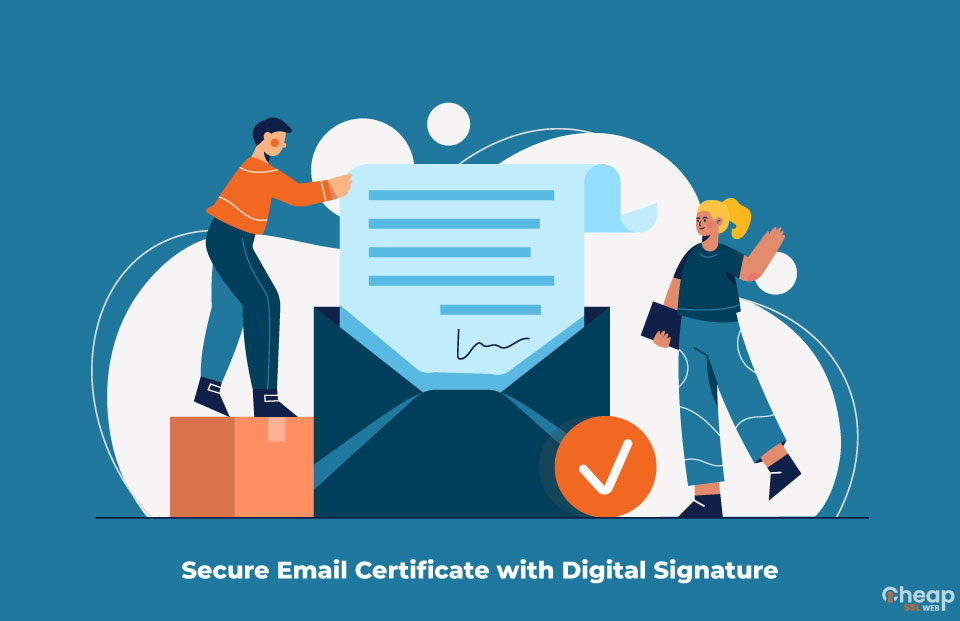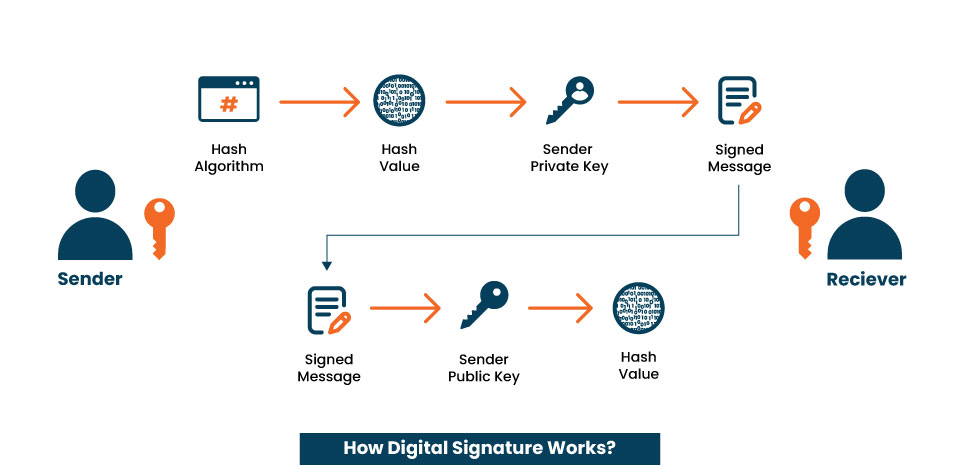What is Secure Email SSL Certificate with Digital Signature?

Secure Email Certificate: All You Need to Know How Email Certificate Works for Secure Email Communication
Emails are an integral part of any business today. Whether for official or marketing purposes, emails play a big part in transferring information from one system to another. Unfortunately, cybercriminals also love emails, especially when it is directed from one business to another or their clients.
It is so because business emails carry crucial and sensitive information that can help them plan an attack. Thankfully, technological experts have also considered this threat and provided a way to minimize its risk through a secure email certificate. So in this blog, we will learn all about Secure Email SSL certificate and how it is used with a digital signature to ensure the right security for your emails. Let us start!
Covering the Basics of Digital Signature
Before jumping ahead and learning about the secure email certificate, let us learn some basic concepts about digital signatures.
What is a Digital Signature?
A digital signature, also referred to as a public key signature, is a cryptographic method of stamping a program, file, email, etc., to showcase the data of the file has not been modified after getting the signature.
A digital signature is considered trusted because you need a security certificate issued by an authentic Certification Authority to sign documents, files, and emails digitally. The CA verifies you and your business before issuing you the certificate and ensures that you won’t be using the security certificate for cyber criminal activities.
Once you receive the certificate (in case of email, an Email Security Certificate will be issued to you), you can use it to digitally sign emails. And as a trusted CA issued the certificate, your digital signature will be considered valid.
Comodo SMIME Certificate is considered as the most trusted and highly adopted certificate to secure email digitally and adding the digital signature.
How Does a Digital Signature Work in Secure Email Certificate?
The digital signature process in emails and otherwise is conducted using two cryptographic keys (public and private keys). The sender digitally signs a message or email on their system using a private key.
The file is further transferred and received in encrypted form on the receiver’s device. The receiver then utilizes the public key given by the sender, allowing them to access the email and its data.

Understanding the Process of Email Certificate with an Example
- The sender generates a pair of keys and shares the public key with the receiver (a one-time pre-requisite).
- The sender then leverages his private key to sign an email and send it to the receiver.
- The receiver receives the message on his system and verifies the signature using the given public key by the sender.
What is a Secure Email Certificate?
A Secure Email Certificate, commonly known as a S/MIME certificate, is a security certificate issued to businesses and individuals who wish to protect their emails from hacks and cyber attacks.
The email security certificate allows users to send sensitive and crucial data over mail through a protected mechanism. Secure email certificate is mostly used by small to mid to large scale businesses.
The three major characteristics of a secure email certificate are:
- It enables you to digitally sign emails and ensure the mail is sent by you only and not by any fake identity.
- It ensures that the data of the email has not been modified ever since it was digitally signed by the user.
- It encrypts the emails before leaving your mailbox through cryptographic keys and protects both data at rest and in transition.
How Does a Secure Email Certificate Work?
The working of a secure email certificate and digital signature is similar.
- An email security certificate leverages the public key infrastructure (PKI).
- All email addresses need to have a set of asymmetric keys that is public, and its corresponding private key to use a secure email certificate.
- The sender encrypts their email using a private key and sends it to the receiver via insecure internet.
- The receiver already has stored the corresponding public key on its system.
- They utilize it over the digitally signed email to decrypt data and access the needed information.
Why is a Secure Email Certificate Important?
A secure email certificate is highly important, especially if you send and receive several business emails carrying sensitive business data. Here are some of the reasons why an email security certificate is important:
1. A Secure Email Certificate Enables You to Securely Transfers Your Emails
Most data hacks occur when the data of the file is transferred from one system to another. In between the transfer, the hackers manage to steal some or all portions of data to harm the user’s system.
However, data hacking becomes ineffective when your emails are protected with a secure email certificate and digital signature. Hence, it is important for businesses to always use digital signatures while sending their emails.
2. It Helps Authenticate the Email Sender’s Identity
People usually mistake personalized email signatures for digital signatures. A personalized email signature is a graphic added at the footer of your email depicting the organization of the sender. However, it has nothing to do with email security and can be tampered with in seconds.
On the other hand, a secure email certificate enables you to digitally sign emails using your server’s private keys. The encrypted email then further can only be accessed by the sender using their public key. This process helps your email receiver to authenticate the sender and ensure the safety of the message.
3. SEC Enables Higher Email Integrity
The entire email content, including any attachments, is hashed and encrypted using a digital signature certificate. An algorithm is used to convert the data into a fixed-size string of numbers and letters, which is known as hashing. Each generated hash value is unique, meaning if you resend the same message, a new hash value will be generated.
When the receiver gets the file, the server regenerates a new hash value that must match the hash value of the received email. If any alterations have been done to the data, the hash value won’t match, suggesting that the security of the file has been breached. If the value matches, you will get access to email ensuring complete data integrity.
How to Send a Digitally Signed Message or Email with S/MIME?
Before sending your digitally signed emails, you must first purchase a secure email certificate from a verified CA (Certification Authority). Fox example, Comodo Enterprise SMIME Certificate. Once you have received the certificate, next is to add the certificate to the key-chain on your computer.
Another thing to consider before sending digitally signed mail is having a copy of each recipient’s certificate stored with the contacts in Outlook. In case the recipient you are listing is already available on an LDAP directory service used by Microsoft Exchange Server, the directory information will automatically be available to you. To further send the email with your digital signature, follow the given process:
For Outlook Users
- Go to the tools tab in Outlook and click on Accounts.
- Select the account which you will be using to send the encrypted message.
- Select Advanced and go to Security.
- You will see a Certificate section here depicting all your purchased security certificates.
- Choose the certificate you wish to use and click Ok. (This is a one-time process that you need to do the first time).
- Once done, open your email message, select Options -> Security -> Encrypt Message and write down the content of your email.
- Send the email.
For Microsoft 365 Users
- Open your new email message.
- Choose Options -> Encrypt -> Encrypt with S/MIME Option.
- Write the email content.
- Send the email.
Does Your Business Really Need a Secure Email Certificate?
Coming to one of the most crucial questions, does your business really require a S/MIME or email security certificate? We will answer that question with a firm Yes.
A digital email signature is vital in providing security to your emails and ensuring the safety of your email data. Some other reasons why your business needs a secure email certificate are given below:
1. To Secure Sensitive and Confidential Information
Email encryption can protect crucial business information such as credit card details, bank account numbers, etc. The encryption prevents outsiders from intercepting sensitive data between the sender’s mail server and your email server. Protecting this information helps eliminate various business risks that can harm your organization.
A secure email certificate is an essential parameter that can enhance the security of your data and protect it from various cyber-attacks. Phishing is one of the most common attacks used for email data hacking. However, with the right email security, you get protected against all kinds of phishing attacks.
2. To Build and Protect Organization’s Reputation
An organization’s reputation is always at risk. One mistake and the trust gained by thousands of users break down, leading to severe outcomes for the company.
Data leak is one such risk that must be thoughtfully dealt with by organizations using a digital signature in their emails. It will allow you to maintain a better customer-business relationship and ensure your user’s data security.
3. To Comply with Regulations and Laws
As online businesses grow and scale their operation, the need for adhering to the rules and regulations of various authorities becomes important. Different authorities suggest several rules for online businesses that they must follow to protect the personal information of their consumers.
And one of the essential guidelines for businesses that use sensitive user information like their credit cards, medical history, etc., is that they must have an authentic, secure email certificate. If not, the business can be fined and even shut down, making it mandatory for organizations to purchase an email security certificate.
Conclusion
A secure email certificate is crucial if you wish to uphold the privacy, establish integrity, secure sensitive data, and eliminate data security risks. With the right email certificate, you can ensure the safety of your customer and business data. To get more information on secure email certificates, get in touch with our expert team.
